Analyzing the Diverse Purposes of Modern Businesses: A Case Study
VerifiedAdded on 2020/10/22
|8
|2535
|464
Case Study
AI Summary
This case study examines the multifaceted purposes of businesses, moving beyond simple profit generation. It explores the importance of corporate social responsibility (CSR), detailing how businesses contribute to societal well-being through donations, ethical practices, and environmental policies. The study emphasizes customer satisfaction as a critical factor for business growth and retention, highlighting the significance of quality products and services, market research, and customer loyalty. Furthermore, it delves into the significance of ethical business practices, regulatory compliance, and the role of technological innovation in improving business operations and competitive advantage. The case study also underscores the importance of maximizing stakeholder needs, including employees, customers, and investors, for sustainable business success and highlights the potential negative consequences of neglecting these needs. In conclusion, the case study argues that successful businesses prioritize a range of objectives, including social welfare, customer satisfaction, ethical conduct, and technological advancement, rather than solely focusing on financial gains.

CASE STUDY
Paraphrase This Document
Need a fresh take? Get an instant paraphrase of this document with our AI Paraphraser

Table of Contents
INTRODUCTION ..........................................................................................................................3
MAIN BODY...................................................................................................................................3
CONCLUSION................................................................................................................................7
REFERENCES ...............................................................................................................................8
INTRODUCTION ..........................................................................................................................3
MAIN BODY...................................................................................................................................3
CONCLUSION................................................................................................................................7
REFERENCES ...............................................................................................................................8
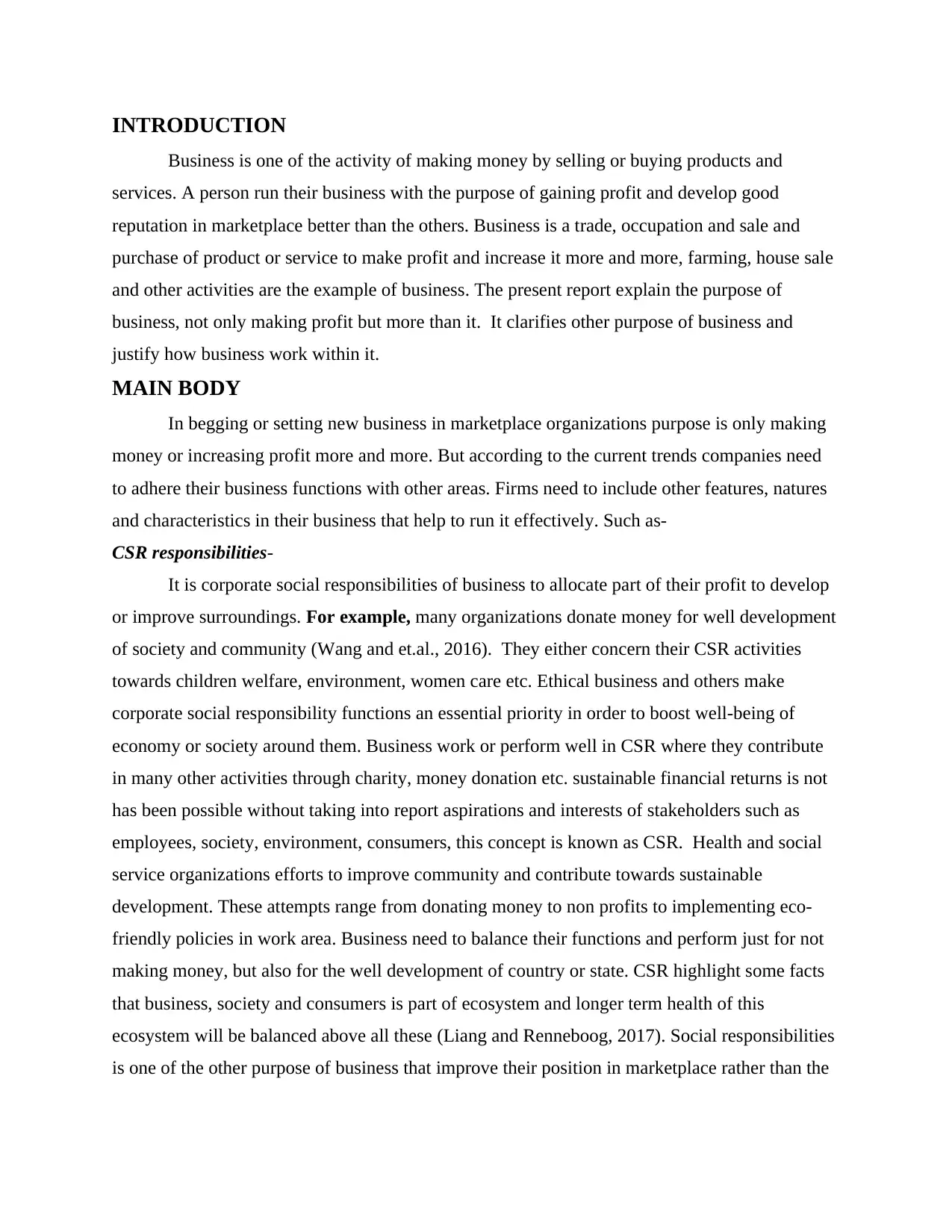
INTRODUCTION
Business is one of the activity of making money by selling or buying products and
services. A person run their business with the purpose of gaining profit and develop good
reputation in marketplace better than the others. Business is a trade, occupation and sale and
purchase of product or service to make profit and increase it more and more, farming, house sale
and other activities are the example of business. The present report explain the purpose of
business, not only making profit but more than it. It clarifies other purpose of business and
justify how business work within it.
MAIN BODY
In begging or setting new business in marketplace organizations purpose is only making
money or increasing profit more and more. But according to the current trends companies need
to adhere their business functions with other areas. Firms need to include other features, natures
and characteristics in their business that help to run it effectively. Such as-
CSR responsibilities-
It is corporate social responsibilities of business to allocate part of their profit to develop
or improve surroundings. For example, many organizations donate money for well development
of society and community (Wang and et.al., 2016). They either concern their CSR activities
towards children welfare, environment, women care etc. Ethical business and others make
corporate social responsibility functions an essential priority in order to boost well-being of
economy or society around them. Business work or perform well in CSR where they contribute
in many other activities through charity, money donation etc. sustainable financial returns is not
has been possible without taking into report aspirations and interests of stakeholders such as
employees, society, environment, consumers, this concept is known as CSR. Health and social
service organizations efforts to improve community and contribute towards sustainable
development. These attempts range from donating money to non profits to implementing eco-
friendly policies in work area. Business need to balance their functions and perform just for not
making money, but also for the well development of country or state. CSR highlight some facts
that business, society and consumers is part of ecosystem and longer term health of this
ecosystem will be balanced above all these (Liang and Renneboog, 2017). Social responsibilities
is one of the other purpose of business that improve their position in marketplace rather than the
Business is one of the activity of making money by selling or buying products and
services. A person run their business with the purpose of gaining profit and develop good
reputation in marketplace better than the others. Business is a trade, occupation and sale and
purchase of product or service to make profit and increase it more and more, farming, house sale
and other activities are the example of business. The present report explain the purpose of
business, not only making profit but more than it. It clarifies other purpose of business and
justify how business work within it.
MAIN BODY
In begging or setting new business in marketplace organizations purpose is only making
money or increasing profit more and more. But according to the current trends companies need
to adhere their business functions with other areas. Firms need to include other features, natures
and characteristics in their business that help to run it effectively. Such as-
CSR responsibilities-
It is corporate social responsibilities of business to allocate part of their profit to develop
or improve surroundings. For example, many organizations donate money for well development
of society and community (Wang and et.al., 2016). They either concern their CSR activities
towards children welfare, environment, women care etc. Ethical business and others make
corporate social responsibility functions an essential priority in order to boost well-being of
economy or society around them. Business work or perform well in CSR where they contribute
in many other activities through charity, money donation etc. sustainable financial returns is not
has been possible without taking into report aspirations and interests of stakeholders such as
employees, society, environment, consumers, this concept is known as CSR. Health and social
service organizations efforts to improve community and contribute towards sustainable
development. These attempts range from donating money to non profits to implementing eco-
friendly policies in work area. Business need to balance their functions and perform just for not
making money, but also for the well development of country or state. CSR highlight some facts
that business, society and consumers is part of ecosystem and longer term health of this
ecosystem will be balanced above all these (Liang and Renneboog, 2017). Social responsibilities
is one of the other purpose of business that improve their position in marketplace rather than the
⊘ This is a preview!⊘
Do you want full access?
Subscribe today to unlock all pages.

Trusted by 1+ million students worldwide
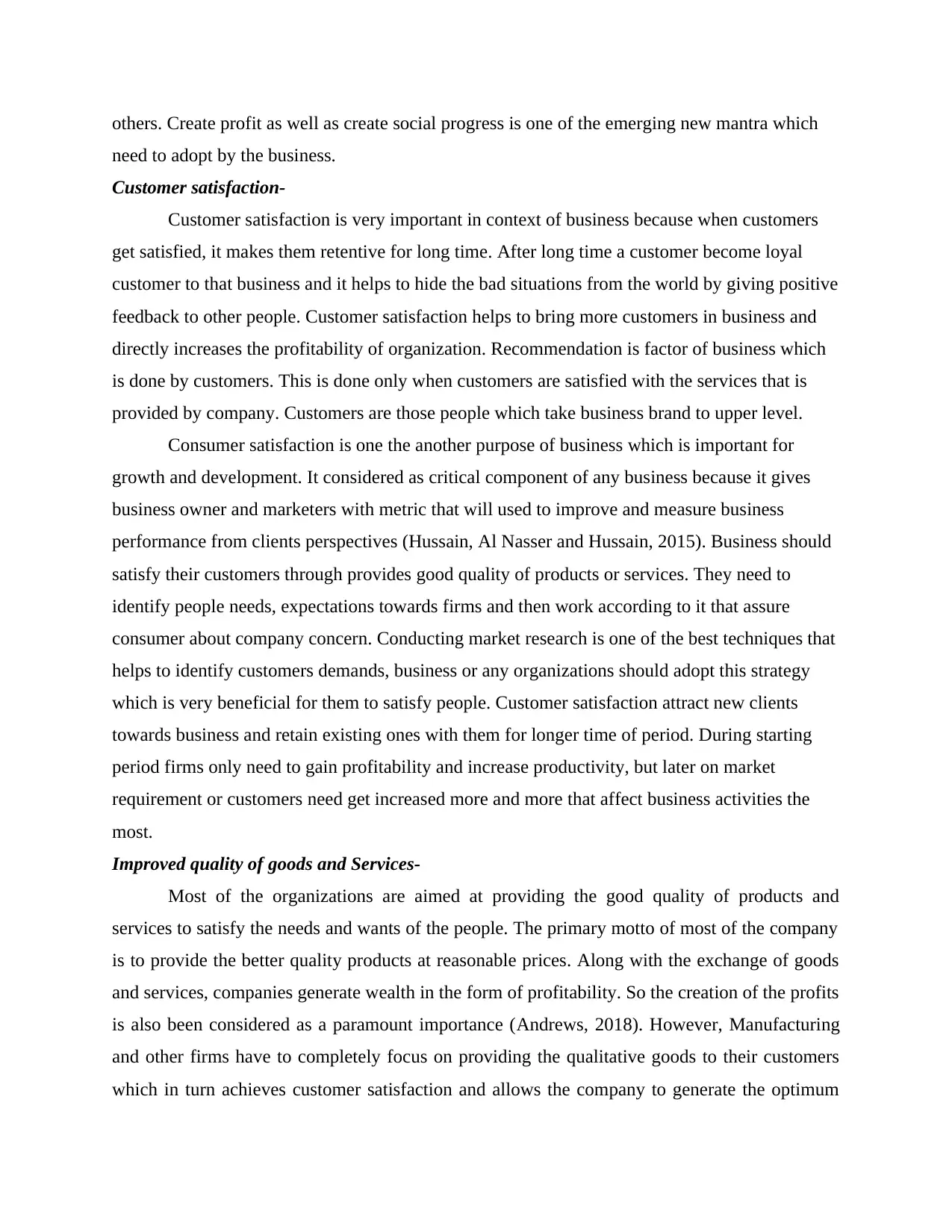
others. Create profit as well as create social progress is one of the emerging new mantra which
need to adopt by the business.
Customer satisfaction-
Customer satisfaction is very important in context of business because when customers
get satisfied, it makes them retentive for long time. After long time a customer become loyal
customer to that business and it helps to hide the bad situations from the world by giving positive
feedback to other people. Customer satisfaction helps to bring more customers in business and
directly increases the profitability of organization. Recommendation is factor of business which
is done by customers. This is done only when customers are satisfied with the services that is
provided by company. Customers are those people which take business brand to upper level.
Consumer satisfaction is one the another purpose of business which is important for
growth and development. It considered as critical component of any business because it gives
business owner and marketers with metric that will used to improve and measure business
performance from clients perspectives (Hussain, Al Nasser and Hussain, 2015). Business should
satisfy their customers through provides good quality of products or services. They need to
identify people needs, expectations towards firms and then work according to it that assure
consumer about company concern. Conducting market research is one of the best techniques that
helps to identify customers demands, business or any organizations should adopt this strategy
which is very beneficial for them to satisfy people. Customer satisfaction attract new clients
towards business and retain existing ones with them for longer time of period. During starting
period firms only need to gain profitability and increase productivity, but later on market
requirement or customers need get increased more and more that affect business activities the
most.
Improved quality of goods and Services-
Most of the organizations are aimed at providing the good quality of products and
services to satisfy the needs and wants of the people. The primary motto of most of the company
is to provide the better quality products at reasonable prices. Along with the exchange of goods
and services, companies generate wealth in the form of profitability. So the creation of the profits
is also been considered as a paramount importance (Andrews, 2018). However, Manufacturing
and other firms have to completely focus on providing the qualitative goods to their customers
which in turn achieves customer satisfaction and allows the company to generate the optimum
need to adopt by the business.
Customer satisfaction-
Customer satisfaction is very important in context of business because when customers
get satisfied, it makes them retentive for long time. After long time a customer become loyal
customer to that business and it helps to hide the bad situations from the world by giving positive
feedback to other people. Customer satisfaction helps to bring more customers in business and
directly increases the profitability of organization. Recommendation is factor of business which
is done by customers. This is done only when customers are satisfied with the services that is
provided by company. Customers are those people which take business brand to upper level.
Consumer satisfaction is one the another purpose of business which is important for
growth and development. It considered as critical component of any business because it gives
business owner and marketers with metric that will used to improve and measure business
performance from clients perspectives (Hussain, Al Nasser and Hussain, 2015). Business should
satisfy their customers through provides good quality of products or services. They need to
identify people needs, expectations towards firms and then work according to it that assure
consumer about company concern. Conducting market research is one of the best techniques that
helps to identify customers demands, business or any organizations should adopt this strategy
which is very beneficial for them to satisfy people. Customer satisfaction attract new clients
towards business and retain existing ones with them for longer time of period. During starting
period firms only need to gain profitability and increase productivity, but later on market
requirement or customers need get increased more and more that affect business activities the
most.
Improved quality of goods and Services-
Most of the organizations are aimed at providing the good quality of products and
services to satisfy the needs and wants of the people. The primary motto of most of the company
is to provide the better quality products at reasonable prices. Along with the exchange of goods
and services, companies generate wealth in the form of profitability. So the creation of the profits
is also been considered as a paramount importance (Andrews, 2018). However, Manufacturing
and other firms have to completely focus on providing the qualitative goods to their customers
which in turn achieves customer satisfaction and allows the company to generate the optimum
Paraphrase This Document
Need a fresh take? Get an instant paraphrase of this document with our AI Paraphraser
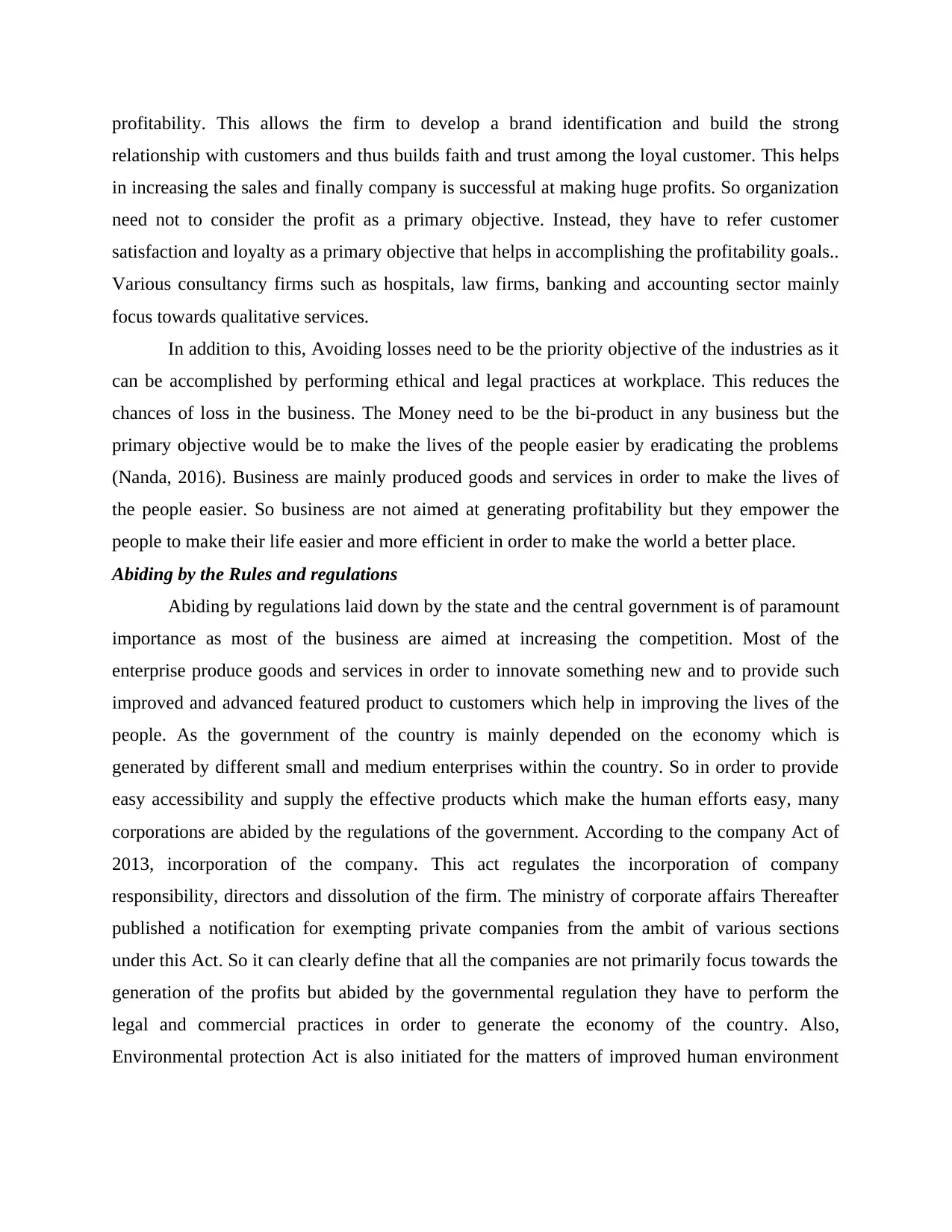
profitability. This allows the firm to develop a brand identification and build the strong
relationship with customers and thus builds faith and trust among the loyal customer. This helps
in increasing the sales and finally company is successful at making huge profits. So organization
need not to consider the profit as a primary objective. Instead, they have to refer customer
satisfaction and loyalty as a primary objective that helps in accomplishing the profitability goals..
Various consultancy firms such as hospitals, law firms, banking and accounting sector mainly
focus towards qualitative services.
In addition to this, Avoiding losses need to be the priority objective of the industries as it
can be accomplished by performing ethical and legal practices at workplace. This reduces the
chances of loss in the business. The Money need to be the bi-product in any business but the
primary objective would be to make the lives of the people easier by eradicating the problems
(Nanda, 2016). Business are mainly produced goods and services in order to make the lives of
the people easier. So business are not aimed at generating profitability but they empower the
people to make their life easier and more efficient in order to make the world a better place.
Abiding by the Rules and regulations
Abiding by regulations laid down by the state and the central government is of paramount
importance as most of the business are aimed at increasing the competition. Most of the
enterprise produce goods and services in order to innovate something new and to provide such
improved and advanced featured product to customers which help in improving the lives of the
people. As the government of the country is mainly depended on the economy which is
generated by different small and medium enterprises within the country. So in order to provide
easy accessibility and supply the effective products which make the human efforts easy, many
corporations are abided by the regulations of the government. According to the company Act of
2013, incorporation of the company. This act regulates the incorporation of company
responsibility, directors and dissolution of the firm. The ministry of corporate affairs Thereafter
published a notification for exempting private companies from the ambit of various sections
under this Act. So it can clearly define that all the companies are not primarily focus towards the
generation of the profits but abided by the governmental regulation they have to perform the
legal and commercial practices in order to generate the economy of the country. Also,
Environmental protection Act is also initiated for the matters of improved human environment
relationship with customers and thus builds faith and trust among the loyal customer. This helps
in increasing the sales and finally company is successful at making huge profits. So organization
need not to consider the profit as a primary objective. Instead, they have to refer customer
satisfaction and loyalty as a primary objective that helps in accomplishing the profitability goals..
Various consultancy firms such as hospitals, law firms, banking and accounting sector mainly
focus towards qualitative services.
In addition to this, Avoiding losses need to be the priority objective of the industries as it
can be accomplished by performing ethical and legal practices at workplace. This reduces the
chances of loss in the business. The Money need to be the bi-product in any business but the
primary objective would be to make the lives of the people easier by eradicating the problems
(Nanda, 2016). Business are mainly produced goods and services in order to make the lives of
the people easier. So business are not aimed at generating profitability but they empower the
people to make their life easier and more efficient in order to make the world a better place.
Abiding by the Rules and regulations
Abiding by regulations laid down by the state and the central government is of paramount
importance as most of the business are aimed at increasing the competition. Most of the
enterprise produce goods and services in order to innovate something new and to provide such
improved and advanced featured product to customers which help in improving the lives of the
people. As the government of the country is mainly depended on the economy which is
generated by different small and medium enterprises within the country. So in order to provide
easy accessibility and supply the effective products which make the human efforts easy, many
corporations are abided by the regulations of the government. According to the company Act of
2013, incorporation of the company. This act regulates the incorporation of company
responsibility, directors and dissolution of the firm. The ministry of corporate affairs Thereafter
published a notification for exempting private companies from the ambit of various sections
under this Act. So it can clearly define that all the companies are not primarily focus towards the
generation of the profits but abided by the governmental regulation they have to perform the
legal and commercial practices in order to generate the economy of the country. Also,
Environmental protection Act is also initiated for the matters of improved human environment
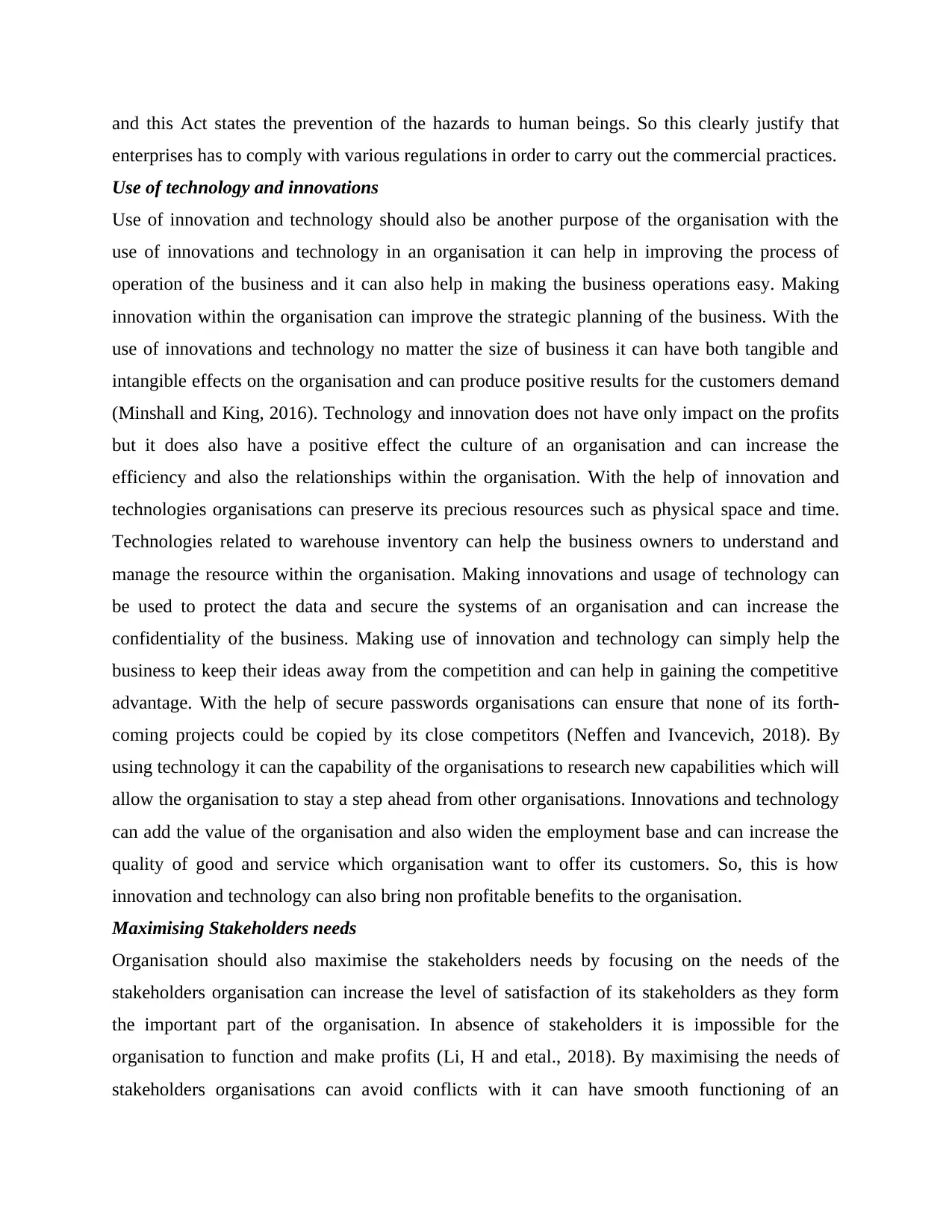
and this Act states the prevention of the hazards to human beings. So this clearly justify that
enterprises has to comply with various regulations in order to carry out the commercial practices.
Use of technology and innovations
Use of innovation and technology should also be another purpose of the organisation with the
use of innovations and technology in an organisation it can help in improving the process of
operation of the business and it can also help in making the business operations easy. Making
innovation within the organisation can improve the strategic planning of the business. With the
use of innovations and technology no matter the size of business it can have both tangible and
intangible effects on the organisation and can produce positive results for the customers demand
(Minshall and King, 2016). Technology and innovation does not have only impact on the profits
but it does also have a positive effect the culture of an organisation and can increase the
efficiency and also the relationships within the organisation. With the help of innovation and
technologies organisations can preserve its precious resources such as physical space and time.
Technologies related to warehouse inventory can help the business owners to understand and
manage the resource within the organisation. Making innovations and usage of technology can
be used to protect the data and secure the systems of an organisation and can increase the
confidentiality of the business. Making use of innovation and technology can simply help the
business to keep their ideas away from the competition and can help in gaining the competitive
advantage. With the help of secure passwords organisations can ensure that none of its forth-
coming projects could be copied by its close competitors (Neffen and Ivancevich, 2018). By
using technology it can the capability of the organisations to research new capabilities which will
allow the organisation to stay a step ahead from other organisations. Innovations and technology
can add the value of the organisation and also widen the employment base and can increase the
quality of good and service which organisation want to offer its customers. So, this is how
innovation and technology can also bring non profitable benefits to the organisation.
Maximising Stakeholders needs
Organisation should also maximise the stakeholders needs by focusing on the needs of the
stakeholders organisation can increase the level of satisfaction of its stakeholders as they form
the important part of the organisation. In absence of stakeholders it is impossible for the
organisation to function and make profits (Li, H and etal., 2018). By maximising the needs of
stakeholders organisations can avoid conflicts with it can have smooth functioning of an
enterprises has to comply with various regulations in order to carry out the commercial practices.
Use of technology and innovations
Use of innovation and technology should also be another purpose of the organisation with the
use of innovations and technology in an organisation it can help in improving the process of
operation of the business and it can also help in making the business operations easy. Making
innovation within the organisation can improve the strategic planning of the business. With the
use of innovations and technology no matter the size of business it can have both tangible and
intangible effects on the organisation and can produce positive results for the customers demand
(Minshall and King, 2016). Technology and innovation does not have only impact on the profits
but it does also have a positive effect the culture of an organisation and can increase the
efficiency and also the relationships within the organisation. With the help of innovation and
technologies organisations can preserve its precious resources such as physical space and time.
Technologies related to warehouse inventory can help the business owners to understand and
manage the resource within the organisation. Making innovations and usage of technology can
be used to protect the data and secure the systems of an organisation and can increase the
confidentiality of the business. Making use of innovation and technology can simply help the
business to keep their ideas away from the competition and can help in gaining the competitive
advantage. With the help of secure passwords organisations can ensure that none of its forth-
coming projects could be copied by its close competitors (Neffen and Ivancevich, 2018). By
using technology it can the capability of the organisations to research new capabilities which will
allow the organisation to stay a step ahead from other organisations. Innovations and technology
can add the value of the organisation and also widen the employment base and can increase the
quality of good and service which organisation want to offer its customers. So, this is how
innovation and technology can also bring non profitable benefits to the organisation.
Maximising Stakeholders needs
Organisation should also maximise the stakeholders needs by focusing on the needs of the
stakeholders organisation can increase the level of satisfaction of its stakeholders as they form
the important part of the organisation. In absence of stakeholders it is impossible for the
organisation to function and make profits (Li, H and etal., 2018). By maximising the needs of
stakeholders organisations can avoid conflicts with it can have smooth functioning of an
⊘ This is a preview!⊘
Do you want full access?
Subscribe today to unlock all pages.

Trusted by 1+ million students worldwide
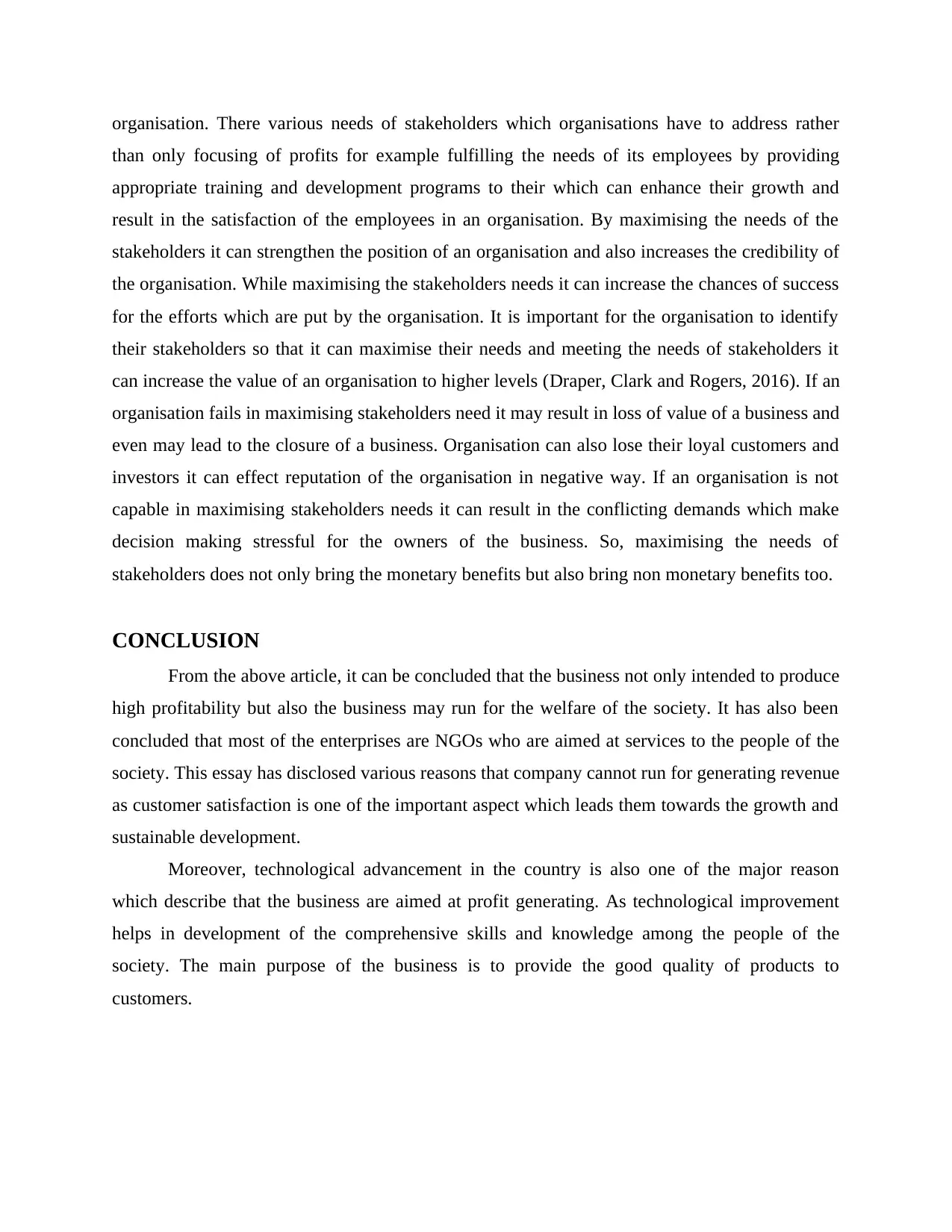
organisation. There various needs of stakeholders which organisations have to address rather
than only focusing of profits for example fulfilling the needs of its employees by providing
appropriate training and development programs to their which can enhance their growth and
result in the satisfaction of the employees in an organisation. By maximising the needs of the
stakeholders it can strengthen the position of an organisation and also increases the credibility of
the organisation. While maximising the stakeholders needs it can increase the chances of success
for the efforts which are put by the organisation. It is important for the organisation to identify
their stakeholders so that it can maximise their needs and meeting the needs of stakeholders it
can increase the value of an organisation to higher levels (Draper, Clark and Rogers, 2016). If an
organisation fails in maximising stakeholders need it may result in loss of value of a business and
even may lead to the closure of a business. Organisation can also lose their loyal customers and
investors it can effect reputation of the organisation in negative way. If an organisation is not
capable in maximising stakeholders needs it can result in the conflicting demands which make
decision making stressful for the owners of the business. So, maximising the needs of
stakeholders does not only bring the monetary benefits but also bring non monetary benefits too.
CONCLUSION
From the above article, it can be concluded that the business not only intended to produce
high profitability but also the business may run for the welfare of the society. It has also been
concluded that most of the enterprises are NGOs who are aimed at services to the people of the
society. This essay has disclosed various reasons that company cannot run for generating revenue
as customer satisfaction is one of the important aspect which leads them towards the growth and
sustainable development.
Moreover, technological advancement in the country is also one of the major reason
which describe that the business are aimed at profit generating. As technological improvement
helps in development of the comprehensive skills and knowledge among the people of the
society. The main purpose of the business is to provide the good quality of products to
customers.
than only focusing of profits for example fulfilling the needs of its employees by providing
appropriate training and development programs to their which can enhance their growth and
result in the satisfaction of the employees in an organisation. By maximising the needs of the
stakeholders it can strengthen the position of an organisation and also increases the credibility of
the organisation. While maximising the stakeholders needs it can increase the chances of success
for the efforts which are put by the organisation. It is important for the organisation to identify
their stakeholders so that it can maximise their needs and meeting the needs of stakeholders it
can increase the value of an organisation to higher levels (Draper, Clark and Rogers, 2016). If an
organisation fails in maximising stakeholders need it may result in loss of value of a business and
even may lead to the closure of a business. Organisation can also lose their loyal customers and
investors it can effect reputation of the organisation in negative way. If an organisation is not
capable in maximising stakeholders needs it can result in the conflicting demands which make
decision making stressful for the owners of the business. So, maximising the needs of
stakeholders does not only bring the monetary benefits but also bring non monetary benefits too.
CONCLUSION
From the above article, it can be concluded that the business not only intended to produce
high profitability but also the business may run for the welfare of the society. It has also been
concluded that most of the enterprises are NGOs who are aimed at services to the people of the
society. This essay has disclosed various reasons that company cannot run for generating revenue
as customer satisfaction is one of the important aspect which leads them towards the growth and
sustainable development.
Moreover, technological advancement in the country is also one of the major reason
which describe that the business are aimed at profit generating. As technological improvement
helps in development of the comprehensive skills and knowledge among the people of the
society. The main purpose of the business is to provide the good quality of products to
customers.
Paraphrase This Document
Need a fresh take? Get an instant paraphrase of this document with our AI Paraphraser
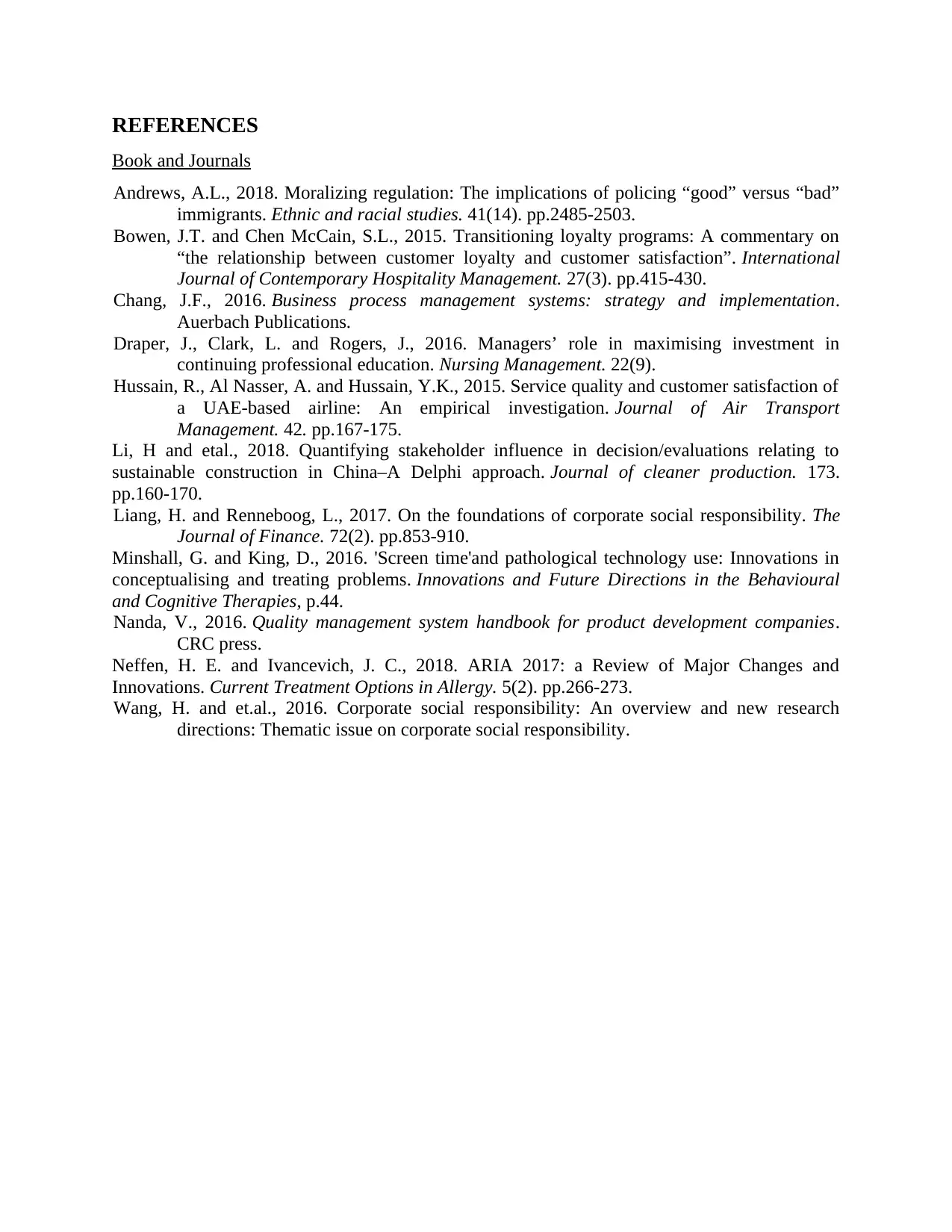
REFERENCES
Book and Journals
Andrews, A.L., 2018. Moralizing regulation: The implications of policing “good” versus “bad”
immigrants. Ethnic and racial studies. 41(14). pp.2485-2503.
Bowen, J.T. and Chen McCain, S.L., 2015. Transitioning loyalty programs: A commentary on
“the relationship between customer loyalty and customer satisfaction”. International
Journal of Contemporary Hospitality Management. 27(3). pp.415-430.
Chang, J.F., 2016. Business process management systems: strategy and implementation.
Auerbach Publications.
Draper, J., Clark, L. and Rogers, J., 2016. Managers’ role in maximising investment in
continuing professional education. Nursing Management. 22(9).
Hussain, R., Al Nasser, A. and Hussain, Y.K., 2015. Service quality and customer satisfaction of
a UAE-based airline: An empirical investigation. Journal of Air Transport
Management. 42. pp.167-175.
Li, H and etal., 2018. Quantifying stakeholder influence in decision/evaluations relating to
sustainable construction in China–A Delphi approach. Journal of cleaner production. 173.
pp.160-170.
Liang, H. and Renneboog, L., 2017. On the foundations of corporate social responsibility. The
Journal of Finance. 72(2). pp.853-910.
Minshall, G. and King, D., 2016. 'Screen time'and pathological technology use: Innovations in
conceptualising and treating problems. Innovations and Future Directions in the Behavioural
and Cognitive Therapies, p.44.
Nanda, V., 2016. Quality management system handbook for product development companies.
CRC press.
Neffen, H. E. and Ivancevich, J. C., 2018. ARIA 2017: a Review of Major Changes and
Innovations. Current Treatment Options in Allergy. 5(2). pp.266-273.
Wang, H. and et.al., 2016. Corporate social responsibility: An overview and new research
directions: Thematic issue on corporate social responsibility.
Book and Journals
Andrews, A.L., 2018. Moralizing regulation: The implications of policing “good” versus “bad”
immigrants. Ethnic and racial studies. 41(14). pp.2485-2503.
Bowen, J.T. and Chen McCain, S.L., 2015. Transitioning loyalty programs: A commentary on
“the relationship between customer loyalty and customer satisfaction”. International
Journal of Contemporary Hospitality Management. 27(3). pp.415-430.
Chang, J.F., 2016. Business process management systems: strategy and implementation.
Auerbach Publications.
Draper, J., Clark, L. and Rogers, J., 2016. Managers’ role in maximising investment in
continuing professional education. Nursing Management. 22(9).
Hussain, R., Al Nasser, A. and Hussain, Y.K., 2015. Service quality and customer satisfaction of
a UAE-based airline: An empirical investigation. Journal of Air Transport
Management. 42. pp.167-175.
Li, H and etal., 2018. Quantifying stakeholder influence in decision/evaluations relating to
sustainable construction in China–A Delphi approach. Journal of cleaner production. 173.
pp.160-170.
Liang, H. and Renneboog, L., 2017. On the foundations of corporate social responsibility. The
Journal of Finance. 72(2). pp.853-910.
Minshall, G. and King, D., 2016. 'Screen time'and pathological technology use: Innovations in
conceptualising and treating problems. Innovations and Future Directions in the Behavioural
and Cognitive Therapies, p.44.
Nanda, V., 2016. Quality management system handbook for product development companies.
CRC press.
Neffen, H. E. and Ivancevich, J. C., 2018. ARIA 2017: a Review of Major Changes and
Innovations. Current Treatment Options in Allergy. 5(2). pp.266-273.
Wang, H. and et.al., 2016. Corporate social responsibility: An overview and new research
directions: Thematic issue on corporate social responsibility.
1 out of 8
Related Documents
Your All-in-One AI-Powered Toolkit for Academic Success.
+13062052269
info@desklib.com
Available 24*7 on WhatsApp / Email
![[object Object]](/_next/static/media/star-bottom.7253800d.svg)
Unlock your academic potential
Copyright © 2020–2026 A2Z Services. All Rights Reserved. Developed and managed by ZUCOL.





